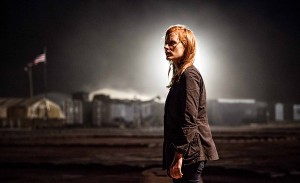‘Zero Dark Thirty’ a thrilling dive into contentious history
-
 At times pulse-pounding and exhausting in detail, “Zero Dark Thirty” is an essential piece of filmmaking and a punctuation mark on a grim decade in American history. Whether it’s an exclamation point or question mark is open for interpretation.
At times pulse-pounding and exhausting in detail, “Zero Dark Thirty” is an essential piece of filmmaking and a punctuation mark on a grim decade in American history. Whether it’s an exclamation point or question mark is open for interpretation.The movie follows Maya (Jessica Chastain), a CIA agent who commits 10 years to gathering information on the whereabouts of Osama bin Laden. We first meet her standing in the shadows at a CIA black site as a colleague (Jason Clarke) employs “advanced interrogation techniques” on a prisoner who may have information on a guy who knows a guy who knows a guy who knows bin Laden.
“Zero Dark Thirty” is a rigorous examination of the tiny details, false leads and incomplete information in that manhunt, and throughout the film Maya represents the physical and psychological toll that search had on those involved. Maya is at first visibly disturbed by the interrogation methods she’s ordered to employ, but as the film progresses, her tenacity makes her the toughest person in the room. She has no problem lecturing her superiors when they disagree with her, even when that boss is the director of the CIA.
Chastain has a commanding and human presence, especially as the movie dives into heavy jargon and military procedure. The climax of the film focuses on the raid of bin Laden’s compound, and even though Maya doesn’t physically go on the mission, she is very much an essential character to the sequence. Add to that, the film’s final scene just might earn Chastain an Academy Award.
Credit should be given to director Kathryn Bigelow and screenwriter Mark Boal (the Oscar-winning team behind “The Hurt Locker”) for giving “Zero Dark Thirty” a vivid, journalistic tone. The movie surely extrapolates and simplifies history, but what we see plays as true as us civilians will probably ever be allowed to understand. Even the climax, a sequence many filmmakers might juice with unnecessary thrills, plays out methodically and stripped of any exaggerated burst of patriotic flare.
Any discussion of “Zero Dark Thirty” will inevitably turn to the portrayal of torture and whether such tactics led to the discovery and assassination of bin Laden. The film doesn’t turn a blind eye to questionable actions made by the military, and information revealed in an early torture scene becomes a bread crumb that Maya follows to the end.
Nevertheless, “Zero Dark Thirty” doesn’t condone torture or even explicitly say that such a tactic led to bin Laden. The movie is attempting to consolidate a 10-year manhunt into two and a half hours, and to exclude scenes of torture would be to ignore a major (and rightfully contentious) part of history.
Bigelow has made a movie that can serve as a conversation starter on the topic of torture, as well as America’s counterterrorism strategy in the last decade and how our nation should move forward. “Zero Dark Thirty” is a thrilling procedural that leaves its audience with hard-to-answer questions and an emotional punch that’s hard to shake.
Grade: A